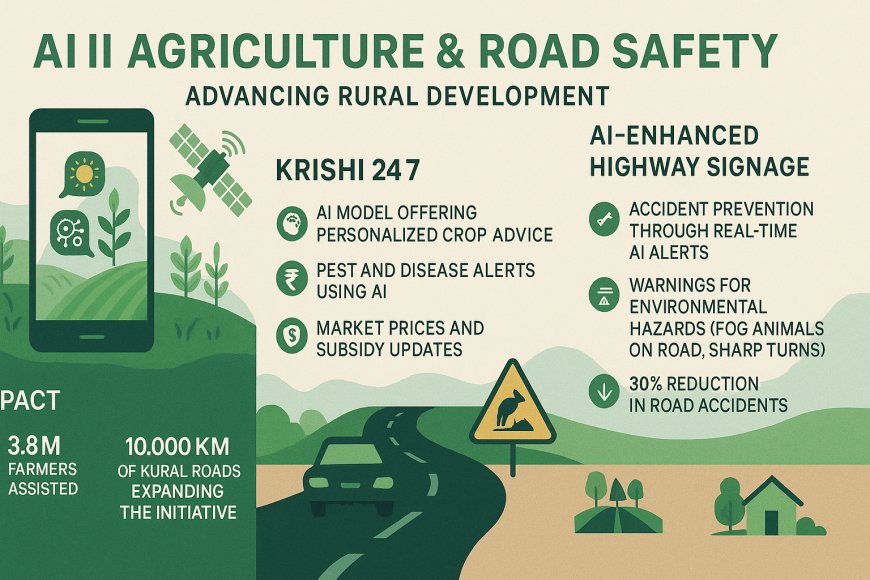AI Revolution in Rural India: Krishi 24/7 and Smart Highway Signage Drive Agricultural and Road Safety Advancements
india rolls out Krishi 24/7 and AI highway signage to boost agriculture and road safety in rural areas — advancing inclusive development with cutting-edge technology.

In a significant stride toward rural transformation, India has begun integrating artificial intelligence (AI) across key sectors like agriculture and road safety. Two recent initiatives — Krishi 24/7, an AI-powered farming advisory platform, and AI-enhanced highway signage systems — are already showing promising results in improving farmers' livelihoods and reducing accidents on rural roads.
These innovations mark a broader shift in India's rural development strategy, where technology is no longer confined to cities but is being actively deployed to uplift villages and semi-urban regions.
Krishi 24/7: AI Meets Agriculture
Launched in early 2025 by the Ministry of Agriculture and Farmers’ Welfare in partnership with ICAR and several agri-tech startups, Krishi 24/7 is a comprehensive digital platform providing real-time, AI-driven agricultural support to farmers in multiple Indian languages.
Built to address the persistent knowledge and resource gaps in rural farming communities, the platform offers:
-
Personalized crop recommendations based on soil type, weather forecasts, and satellite data
-
Pest and disease alerts with image-based AI detection tools
-
Market price updates and procurement rates
-
Voice-based chatbot support, even in low-connectivity areas
Krishi 24/7 is powered by a combination of machine learning algorithms, remote sensing data from ISRO, and on-ground feedback from over 15,000 Krishi Mitras. The platform is integrated with the mKisan portal and is now accessible via the UMANG app.
Dr. Ramesh Chand, Member of NITI Aayog, noted in a recent seminar that “Krishi 24/7 will be the backbone of India’s AI-driven Green Revolution, especially in climate-stressed districts.”
A Lifeline for Smallholder Farmers
One of the platform’s standout features is its soil health intelligence engine, which utilizes satellite imagery and AI to offer hyperlocal insights about fertilizer needs, irrigation schedules, and climate risks. For example, during the early 2025 rabi season, Krishi 24/7 helped over 3.8 million farmers prevent potential losses from a late blight outbreak in potato crops across Uttar Pradesh and Bihar.
Farmers can also access government subsidy notifications and crop insurance claim status via the app, bridging the awareness gap that has long plagued India’s rural outreach systems.
Backed by real-time data from the Mahalanobis National Crop Forecast Centre, the AI platform tailors recommendations that go beyond conventional weather predictions.
AI-Enhanced Highway Signage: Safer Roads for Rural India
In tandem with digital agriculture, AI-powered highway signage systems are being deployed across high-risk rural corridors under the Bharatmala Pariyojana. Developed in collaboration with IIT Hyderabad, the system uses computer vision and machine learning to monitor driver behavior, detect speeding vehicles, and dynamically change digital signboards to issue warnings.
The project’s pilot phase in Karnataka and Rajasthan saw a 30% reduction in nighttime accidents within just four months of deployment, according to data from the Ministry of Road Transport and Highways (MoRTH).
These smart signs use edge-based AI processors to analyze vehicle movement in real-time and alert drivers with flashing messages like “Sharp Turn Ahead” or “Cattle Crossing — Slow Down,” especially in foggy or low-visibility conditions.
MoRTH’s official press release on this initiative can be viewed here.
Bridging Infrastructure Gaps in Villages
India’s rural areas often lack adequate signage, lane markings, and traffic awareness campaigns. By leveraging AI vision systems, the new smart signage units adapt to the unique patterns of rural roads, where informal crossings, narrow lanes, and mixed traffic (including bullock carts and bikes) are common.
The National Highways Authority of India (NHAI) has confirmed plans to extend this system to over 10,000 km of rural highways by March 2026. The signs are powered by solar energy, ensuring minimal maintenance costs and uninterrupted operation even in remote areas.
How AI is Uniting Development Goals
The combined deployment of Krishi 24/7 and AI highway signage illustrates a broader policy shift: using AI to solve context-specific problems in rural India, rather than importing urban solutions wholesale.
Key development goals being addressed include:
-
Doubling farmers’ income through precision agriculture
-
Reducing road fatalities under the India Road Safety Action Plan
-
Digital empowerment of rural youth through tech-skilling and app-based services
-
Boosting resilience to climate change in the agri sector
This transformation is aligned with the National Strategy for Artificial Intelligence (NSAI), which emphasizes AI for social good — especially in domains like health, education, agriculture, and infrastructure.
Challenges Ahead
Despite early successes, the rollout of AI tools in rural India faces real challenges:
-
Digital illiteracy among older farmers
-
Connectivity gaps in remote villages
-
Skepticism and trust issues around machine-generated advice
To tackle these, the government is pairing digital infrastructure with offline support like AI Sahayaks (AI Assistants) and community-based demo centers in gram panchayats. Partnerships with NGOs and agri-cooperatives are also strengthening last-mile engagement.
Final Thoughts
India's embrace of AI in rural sectors is no longer experimental — it's transformational. Platforms like Krishi 24/7 are not just advisory tools but catalysts of empowerment. Meanwhile, AI-driven highway signage is saving lives on roads that were once considered too chaotic for structured intervention.
By placing technology in the hands of rural citizens, India is writing a new chapter in inclusive digital development, where progress travels beyond cities and into the heart of the countryside.











